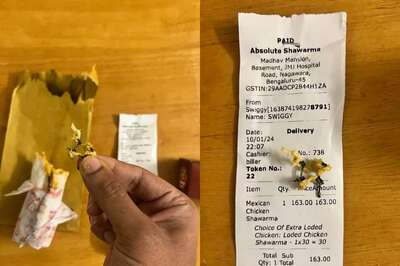
views
New Delhi: With less than a year to go for the 2019 Lok Sabha election, BJP’s allies in Bihar have started flexing muscles over seat sharing. The JD(U), which earlier signaled that it wants to play the role of a senior partner, has now made it clear that it wants the results of the 2015 Bihar Assembly polls to be the key factor while deciding how many seats each of the four NDA parties in the state will get to contest.
In the Assembly elections, Nitish Kumar’s party had fared much better than the BJP and party leaders said that as it was the latest show of strength in the state, its outcome could not be ignored while distributing seats for the general election.
The demand, however, is unlikely to be met with any enthusiasm by the BJP or two of its other allies - the Ram Vilas Paswan-led Lok Janshakti Party (LJP) and the Upendra Kushwaha-led Rashtriya Lok Samata Party (RLSP).
Formal talks over a seat-sharing formula among the NDA constituents are yet to begin and JD(U) leaders, who spoke on the condition of anonymity, said the BJP should take the lead to ensure that it was done quickly to avoid any serious differences near the polls.
At the party’s forthcoming national executive meet scheduled to be held in New Delhi on July 8, it is expected to deliberate on its strategy for the general elections and take up the contentious issue of seat-sharing.
Sources said JD(U) would also raise its old demand for special category status to Bihar as pressure tactics on the BJP-led NDA government at the Centre.
A BJP leader described the JD(U)'s argument of dividing seats based on 2015 results as "unrealistic" and dismissed it as "usual political tactics" deployed by different parties ahead of elections.
In the Assembly election, the JD(U) had won 71 of the 243 seats, while the BJP had emerged victorious in 53 seats and the LJP and RLSP in two each. The JD(U) was then an ally of the RJD and the Congress, before it dumped them last year to rejoin the NDA.
He claimed that the JD(U) had benefited in the 2015 polls due to its alliance with the Lalu Prasad-led Rashtriya Janata Dal (RJD) and the real strength of the Nitish Kumar-led party could be gauged from its 2014 Lok Sabha poll performance, when it had fought alone and won only two of the 40 seats, while its candidates lost their deposit in a majority of seats.
In the 2014 polls, the BJP had won 22 seats with the LJP and the RLSP winning six and three seats respectively.
When the JD(U) was a BJP ally till 2013, it was the undisputed senior coalition partner in the state and would contest more number of Lok Sabha as well as Assembly seats. In Lok Sabha polls, the JD(U) would field candidates in 25 seats and the BJP 15.
However, the BJP's sweep in 2014 has changed the equation and the entry of more parties into the NDA means old equations are no longer relevant.
With talks among the NDA constituents yet to begin, the JD(U) has been playing hardball. Its leaders recently kept away from the Yoga Day celebrations and the party has said it will fight Assembly elections in states like Madhya Pradesh and Chhattisgarh, which are scheduled later this year.



















Comments
0 comment